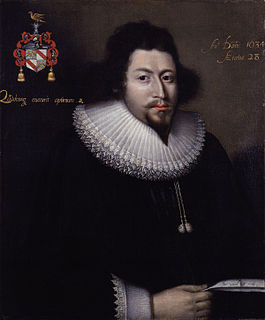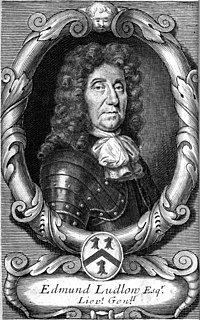Related Research Articles

Major-General Thomas Harrison sided with Parliament in the English Civil War. During the Interregnum he was a leader of the Fifth Monarchists. In 1649 he signed the death warrant of Charles I and in 1660, shortly after the Restoration, he was found guilty of regicide and hanged, drawn and quartered.

The Protectorate was the period during the Commonwealth during which England and Wales, Scotland, Ireland and the English overseas possessions were governed by a Lord Protector as a republic. The Protectorate began in 1653, when the dissolution of the Rump Parliament and then Barebone's Parliament allowed Oliver Cromwell to be appointed Lord Protector of the Commonwealth under the terms of the Instrument of Government. In 1659, the Protectorate Parliament was dissolved by the Committee of Safety as Richard Cromwell, who had succeeded his father as Lord Protector, was unable to keep control of the Parliament and the Army. That marked the end of the Protectorate and the start of a second period of rule by the Rump Parliament as the legislature and the Council of State as the executive.

The Rump Parliament was the English Parliament after Colonel Thomas Pride purged the Long Parliament, on 6 December 1648, of those members hostile to the Grandees' intention to try King Charles I for high treason.

Sir Bulstrode Whitelocke was an English lawyer, writer, parliamentarian and Lord Keeper of the Great Seal of England.

William Lenthall (1591–1662) was an English politician of the Civil War period. He served as Speaker of the House of Commons for a period of almost twenty years, both before and after the execution of King Charles I.

Edmund Ludlow was an English parliamentarian, best known for his involvement in the execution of Charles I, and for his Memoirs, which were published posthumously in a rewritten form and which have become a major source for historians of the Wars of the Three Kingdoms. Ludlow was elected a Member of the Long Parliament and served in the Parliamentary armies during the English Civil Wars. After the establishment of the Commonwealth in 1649 he was made second-in-command of Parliament's forces in Ireland, before breaking with Oliver Cromwell over the establishment of the Protectorate. After the Restoration Ludlow went into exile in Switzerland, where he spent much of the rest of his life. Ludlow himself spelled his name Ludlowe.
The English Council of State, later also known as the Protector's Privy Council, was first appointed by the Rump Parliament on 14 February 1649 after the execution of King Charles I.

The Third Protectorate Parliament sat for one session, from 27 January 1659 until 22 April 1659, with Chaloner Chute and Thomas Bampfylde as the Speakers of the House of Commons. It was a bicameral Parliament, with an Upper House having a power of veto over the Commons.

Sir William Lockhart of Lee (1621–1675), was a Scottish soldier and diplomat who fought for the Covenanters during the 1638 to 1651 Wars of the Three Kingdoms. Following Royalist defeat in the 1642 to 1647 First English Civil War, Lockhart took part in negotiations between Charles I and Scottish Engagers, who agreed to restore him to the English throne.
Henry Cary, 4th Viscount Falkland was an English politician who sat in the House of Commons between 1659 and 1663.
Francis Osborne was an English essayist, known for his Advice to a Son, which became a very popular book soon after the English Restoration.
The High Sheriff of Oxfordshire, in common with other counties, was originally the King's representative on taxation upholding the law in Saxon times. The word Sheriff evolved from 'shire-reeve'.
John Wilde was an English lawyer and politician. As a serjeant-at-law he was referred to as Serjeant Wilde before he was appointed judge. He was a judge, chief baron of the exchequer, and member of the Council of State of the Commonwealth period.
Henry Wilkinson (1610–1675) was an English clergyman, in the Commonwealth period a canon of Christ Church, Oxford, Lady Margaret Professor of Divinity, and member of the Westminster Assembly. Later he was a nonconformist preacher.
Anthony Stapley was one of the regicides of King Charles I of England.
John James was an English politician who sat in the House of Commons in 1653. He served in the Parliamentary army in the English Civil War.

Nether Worton is a hamlet in Oxfordshire, about 6+1⁄2 miles (10.5 km) south of Banbury and 7 miles (11 km) east of Chipping Norton. Nether Worton was a separate civil parish until 1932, when it was merged with Over Worton to form the current civil parish of Worton.
John Osborne (c.1630–1692) was an English barrister and law officer who spent much of his adult life in Ireland. He was the only surviving son of the celebrated writer Francis Osborne, and the subject of his father's most famous book, Advice to a Son (1656–1658).

Over Worton is a hamlet in Oxfordshire, about 7 miles (11 km) south of Banbury and 7+1⁄2 miles (12 km) east of Chipping Norton. Over Worton was a separate civil parish until 1932, when it was merged with Nether Worton to form the current civil parish of Worton.
References
- ↑ Osborne dedicated the second part of Advice to a Son to "My dear brother William Draper esq. of Netherworton, Oxfordshire"
- 1 2 3 W R Williams The Parliamentary History of the County of Oxford
- ↑ Will of William Draper, Gentleman, of Nether Worton, Oxfordshire 29 March 1672 National Archives PROB 11/338/407
| Parliament of England | ||
|---|---|---|
| Preceded by Not represented in Rump Parliament | Member of Parliament for Oxfordshire 1653 With: Sir Charles Wolseley Dr Jonathan Goddard | Succeeded by Charles Fleetwood Robert Jenkinson William Lenthall James Whitelocke Nathaniel Fiennes |